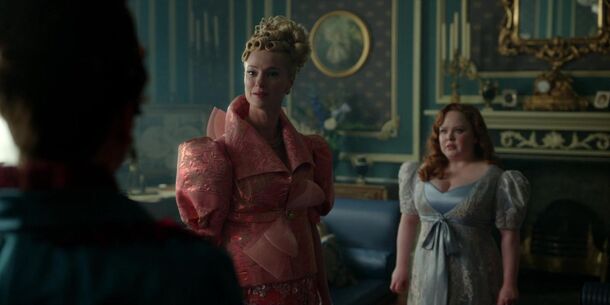For A Female-Empowering Show, Bridgerton Villainizes Too Many Vulnerable Girls

This is the trend that needs to stop.
Summary
- Bridgerton Season 3 raised many questions among the show's massive audience.
- One of them was the disturbing arc of the main antagonist.
- But if you think about it, this is not the first time Bridgerton has done something like this.
Bridgerton Season 3 had many enjoyable moments that we will be swooning over for months to come (sadly, the next chapter is not likely to land on Netflix until 2026 ). However, many viewers couldn't help but be confused by the multiple storylines and themes.
On the one hand, the main concept of the season was clear as day - butterfly-like transformation and finding self-worth. On the other hand, it mainly applied to the character of Penelope Featherington aka Lady Whistledown.
Central Character
Penelope was a kind of representative of wallflowers everywhere. The role model that was supposed to empower and inspire viewers. Even the title character, Colin Bridgerton, sometimes felt like this prince, a perfect, ripped and kind romantic partner placed in the story for the sole purpose of elevating Pen.
But if the Bridgerton creators wanted to empower female viewers with Season 3, they got it wrong. Yes, Penelope's arc ended with her getting it all. But there was another storyline that turned out to be off-putting, to say the least.
Antagonist Done Wrong in Season 3
The main antagonist of the season was undoubtedly Cressida Cowper. In the second part, Miss Cowper was pitted against Penelope as her eternal tormentor, threatening to reveal her secret writing hobby to everyone. And it would work fine if Cressida remained ill-mannered, spoiled and cruel rich girl she was in previous seasons and Julia Quinn's source book.
But the showmakers decided to add her backstory, to show her cold home, abusive father, always frightened mother, and the prospect of marriage to an old man hanging over her head. Frankly, Cressida's situation felt much worse than Penelope's. We wanted her to get that reward and run away from that horrible home.

However, in the end, she lost everything, her friend, her reputation, and her freedom (fortunately, the senile groom disappeared). And that did not feel empowering at all. But if you think the writers only made this self-contradictory move in Season 3, think again. Earlier chapters also villainized vulnerable women and gave them extremely questionable endings.
Desperate Debutante in Season 1
In the premiere season, we had Marina Thompson, the Featheringtons' cousin, who was forced to come to London to find a husband while the love of her life was away at war.
The eighteen-year-old confused girl found out she was pregnant and was made to believe that the father of the baby had abandoned her. That's the situation we're supposed to sympathize with. But Bridgerton somehow managed to turn Marina's desperate (and foolish) attempts to get out of this mess into actions that felt villainous. Just look at how much hate the character got online.
Ignorant Bride-to-be in Season 2
Speaking of hate, Season 2 had its own Marina and Cressida who earned the disapproval of viewers. While in the book Miss Edwina Sharma, the sister of the female lead, was one of the first to notice the attraction between Kate and Anthony, in the show Edwina came across as gullible and self-centered.
But why wouldn't she be? The show introduced Edwina as her family 's only hope of staying afloat, and Anthony was constantly misleading the young debutante into thinking he was serious about their courtship.
Remember, the girl was barely eighteen and had no experience in matters of the heart. Does that seem evil at all? Yet, somehow the writers managed to turn the audience against Edwina.
All in all, it seems the Bridgerton creators need to stop putting vulnerable girls in antagonistic roles if they want to make sure the show is inspiring and empowering. Or at least not give their villains such relatable arcs.